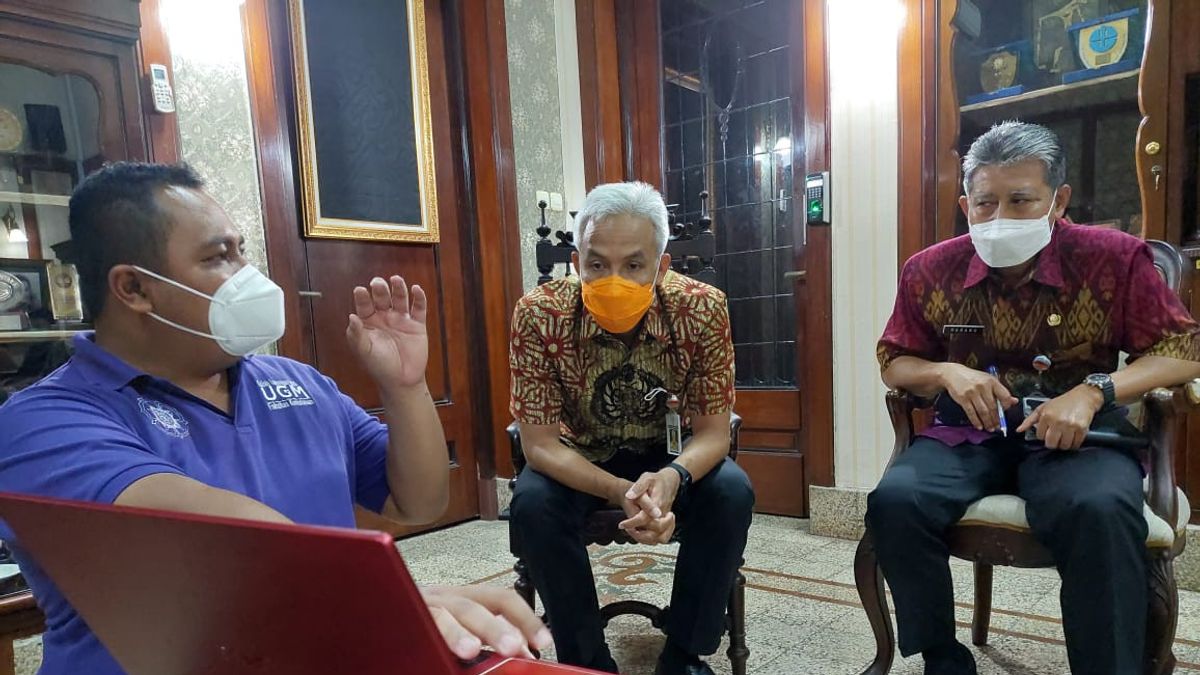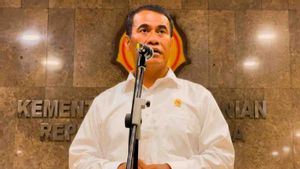JAKARTA - These two young British graduates were challenged by Governor Ganjar Pranowo to build big data in the agricultural sector of Central Java. It didn't take long for the challenge to begin to be answered with tangible results.
Their names are Albertus Gian and Anindita Pradana Suteja. Both of them had been invited by Ganjar to his podcast some time ago. They are Graduates of the University of Manchester UK and Imperial College London who make drones to support the agricultural sector.
Together with a colleague named Pandu Yudha, a lecturer at UGM, Gian and Anindita are ready to realize Ganjar's dream of building big data in the agricultural sector.

Ganjar did challenge Gian and Anindita during a podcast on 27 October. Ganjar asked to create a system that can monitor and evaluate the agricultural sector in Central Java.
It didn't take long. Only two weeks after meeting with Ganjar, Gian and Anindita succeeded in establishing a system for managing the agricultural sector in Central Java. They named him Tandhur. A system made specifically to record who, what to plant, where, how much land, agricultural financial calculations to estimate the production of agricultural products.
"A few weeks ago we chatted with Mr. Ganjar, he challenged us to make a monitoring and evaluation system, especially in the agricultural sector. Today I and Ms. Anindita and Mas Pandu came back, answering our promise that we could present a system," said Gian at meet at Ganjar's official residence, Tuesday 16 November.
Gian explained that the system offered was in the form of software. The system will later be used to complete data and programs that have been implemented in Central Java, namely Kartu Tani.
"We will conduct trials in six former residencies in Central Java. We will see if the results are as desired or if there are additions, before they can be implemented in all regions in Central Java," he explained.
While Pandu explained, the Tandhur system is a very simple application. The system will later represent the position of land in Central Java to find out how much agricultural land is.
"In addition, we also mapped the land in terms of its characteristics. With this mapping, it will be known which land is suitable for use by plants," he explained.
Not only that, Pandu continued, the system can also see what the behavior of farmers is in cultivation and the use of production facilities. Fertilizer consumption and chemical use can be detected for financial analysis.
"The final output is that we can map out the estimated production results. Because this is important to determine the price, look at supply and demand including the determination of spots and production zones. All of that will be integrated in only this one system," he explained.
From that meeting, Ganjar strongly agreed and asked for an immediate trial. Gian said that his party targets that the system can be implemented in early December.
"Tomorrow we are immediately asked by Mr. Ganjar to follow up with the relevant agencies, next week we have a working model and early December it can be done," he concluded.
Meanwhile, the Governor of Central Java, Ganjar Pranowo, said he was ready to support the realization of the system. To Gian, Anindita and Pandu, Ganjar asked that the system be tested immediately.
"This is cool, from the presentation it is in accordance with my wishes. I ask for it to be tested immediately. Don't take too long, what do you need, tell us directly," he said.

Ganjar said that he had wanted to improve the agricultural sector for a long time. Improvements can only be made if the agricultural data is absolutely accurate.
"So my dream is to have data, who, what to plant, where, how much land and how much is the estimated harvest. If we can have the data, then agricultural policies will be right on target," he explained.
Not only that, the data is also important in the government's efforts to improve the welfare of farmers. With this data, the government can find out whether the food is in surplus or not, whether it needs imports or not, and so on.
"So we don't keep fighting about it. You know, the data already exists. At the same time, with this data, we know, tomorrow is the rice harvest season, about a few tons of harvest. Where do you sell them. Chili, corn, soybeans and others. Even more far we can control the price, so that farmers do not continue to lose, "he concluded.
The English, Chinese, Japanese, Arabic, and French versions are automatically generated by the AI. So there may still be inaccuracies in translating, please always see Indonesian as our main language. (system supported by DigitalSiber.id)













